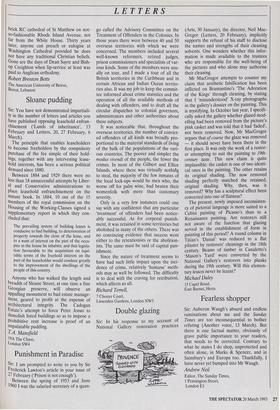Sloane pudding
Sir: You have not demonstrated impartiali- ty in the number of letters and articles you have published opposing leasehold enfran- chisement (`Lands of inheritance', 13 February and Letters, 20, 27 February, 6 March).
The principle that enables leaseholders to become freeholders by the compulsory purchase of the fee simple of their hold- ings, together with any intervening lease- hold interests, has been a serious political demand since 1880.
Between 1884 and 1929 there were no less than 18 unsuccessful attempts by Liber- al and Conservative administrations to place leasehold enfranchisement on the statute book. In 1884, 10 out of the 15 members of the royal commission on the Housing of the Working-Classes signed a supplementary report in which they con- cluded that: The prevailing system of building leases is conducive to bad building, to deterioration of property towards the close of the lease, and to a want of interest on the part of the occu- pier in the house he inhabits; and that legisla- tion favourable to the acquisition on equi- table terms of the freehold interest on the part of the leaseholder would conduce greatly to the improvement of the dwellings of the people of this country.
Anyone who has walked the length and breadth of Sloane Street, at one time a fine Georgian preserve, will observe an appalling monument to bad estate manage- ment, geared to profit at the expense of architectural, integrity. The Cadogan Estate's attempt to force Peter Jones to demolish listed buildings so as to impose a prohibitive rent increase is proof of an unpalatable pudding.
T.A. Mansfield
19A The Chase, London SW4


























































 Previous page
Previous page